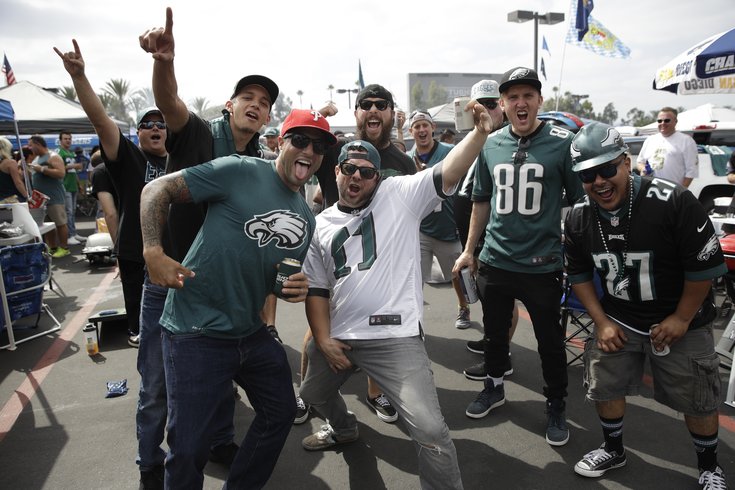
November 15, 2017
 Jae C. Hong/for PhillyVoice
Jae C. Hong/for PhillyVoice
Eagles fans dominated in the stands in Los Angeles today.
With the U.S. Supreme Court expected to hear arguments next month on the legality of sports betting in New Jersey and elsewhere, it's worth asking: How do fantasy sports leagues and betting influence traditional sports fandom?
Or, in other words, does the betting detract from engagement with the actual teams and games?
Curious, we reached out to Joseph Mahan, associate professor at Temple University's School of Sport, Tourism and Hospitality Management and chair of its Department of Sport and Recreation Management, who's conducted a study on fan engagement--ticket-purchasing, TV views and merchandise purchases--among participants in sports betting and fantasy sports.
To start with, can you briefly explain the science behind sports fandom? It's a fairly well-studied fandom, in psychology and sociology. What is it that researchers are generally seeking to understand--and what are the big-picture ideas we've taken away in recent years?
The study of sport fandom has roots in both psychology; e.g., a fan wears team apparel after a win, reflecting in the glory of team success; and sociology, e.g., the ritualistic behaviors occurring at a game. In layman's terms, sport often makes rational people do irrational things. For example, painting your face at a game or reciting team chants like "E-A-G-L-E-S, Eagles!" in a public place are simply not behaviors we see in many other facets of life.
One interesting topic in this area is the extension of fandom into the digital space; namely, how do fans show their support--or displeasure--on social media platforms. The unfettered access to teams, athletes and other fans has brought out the best and, at times, worst in people.
Fantasy sports leagues are a relatively new phenomenon. How is that influencing how people cheer for teams?
There really isn't "multi-team support," but separate processes: on the one hand, you have your favorite team and, on the other, your fantasy players. It's actually quite a delicate balance. For example, if I am an Eagles fan and I have Dak Prescott--the Cowboys quarterback--on my fantasy team, then I still root for the Eagles every Sunday. I also track Prescott's performance...but I don't want the Cowboys to win.
Do you think sports fans rationalize rooting for opposing teams by telling themselves it's more about the players, not the team or city?
One-hundred percent. As sports fans--and human beings--we rationalize such things to avoid cognitive dissonance or the state of our actions not aligning with our beliefs.
This all ties into the sports betting case being debated in [the Supreme Court] ... Are there detriments from the academic perspective to legalizing sports betting? What does research say about [fan engagement with that factored in]?
According to federal law, sports betting does not include fantasy sport--the 2006 Unlawful Internet Gambling Enforcement Act (UIGEA) established a distinction between betting on games and paying to play--or winning in--fantasy; this has extended--thus far--to include Daily Fantasy Sports (DFS) as well. Interestingly, sports betting has long featured a "fan paradox," that is, a fan of one team can bet on other teams in an attempt to win. Yet, a favorite team remains just that.
And what about your study determined that things like fantasy leagues and sports betting increase fan engagement?
Our survey showed that sport fans who participate in fantasy sport and/or sports betting also continue to spend on traditional sport consumer behaviors, like buying tickets and merchandise. That is, fantasy sport participation and sport betting do not replace but, rather, enhance sport consumption.
How unshakeable, then, generally, is a person's fandom to their main team? I've been surprised to see some disavowing their long-time team in the midst of all this kneeling controversy, for example. Has that been surprising to an academic familiar with the intricacies of sports fandom?
In the case of avid fans, there is typically no wavering in support of a favorite team. However, there is a distinction between the psychological attachment to a team; i.e., being a fan, and the behaviors; e.g., watching games or buying merchandise, that are often associated with sport fandom. So, we are seeing fans refusing to watch games, etc., but I would be surprised if that truly leads to disavowing attachment to a team. Certainly, time will tell but denouncing a team--or the NFL entirely--is more likely for those on the lower end of the sport-fandom scale.